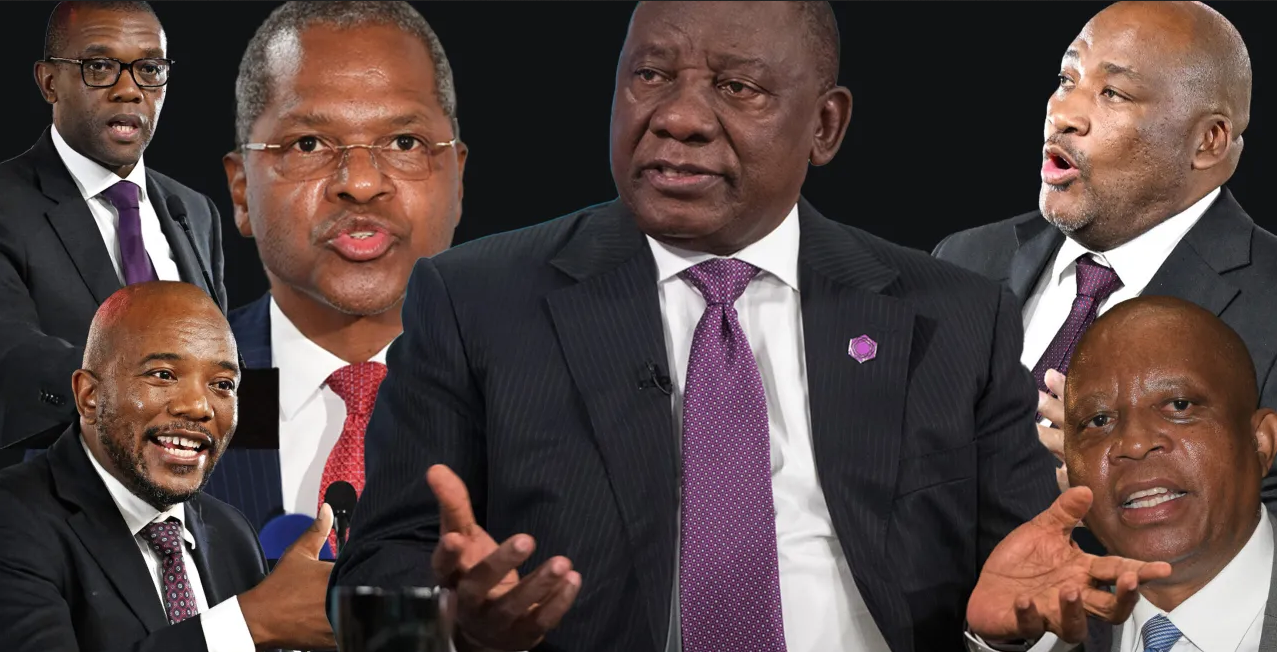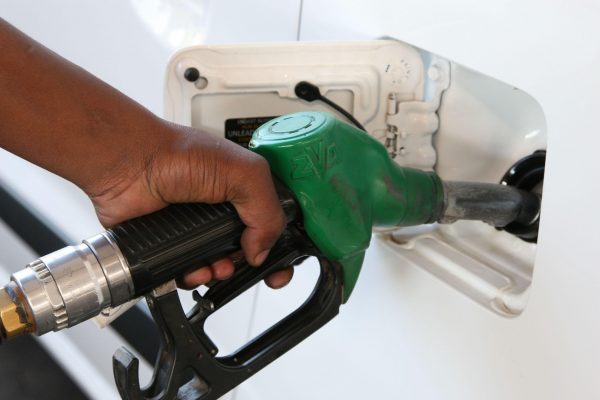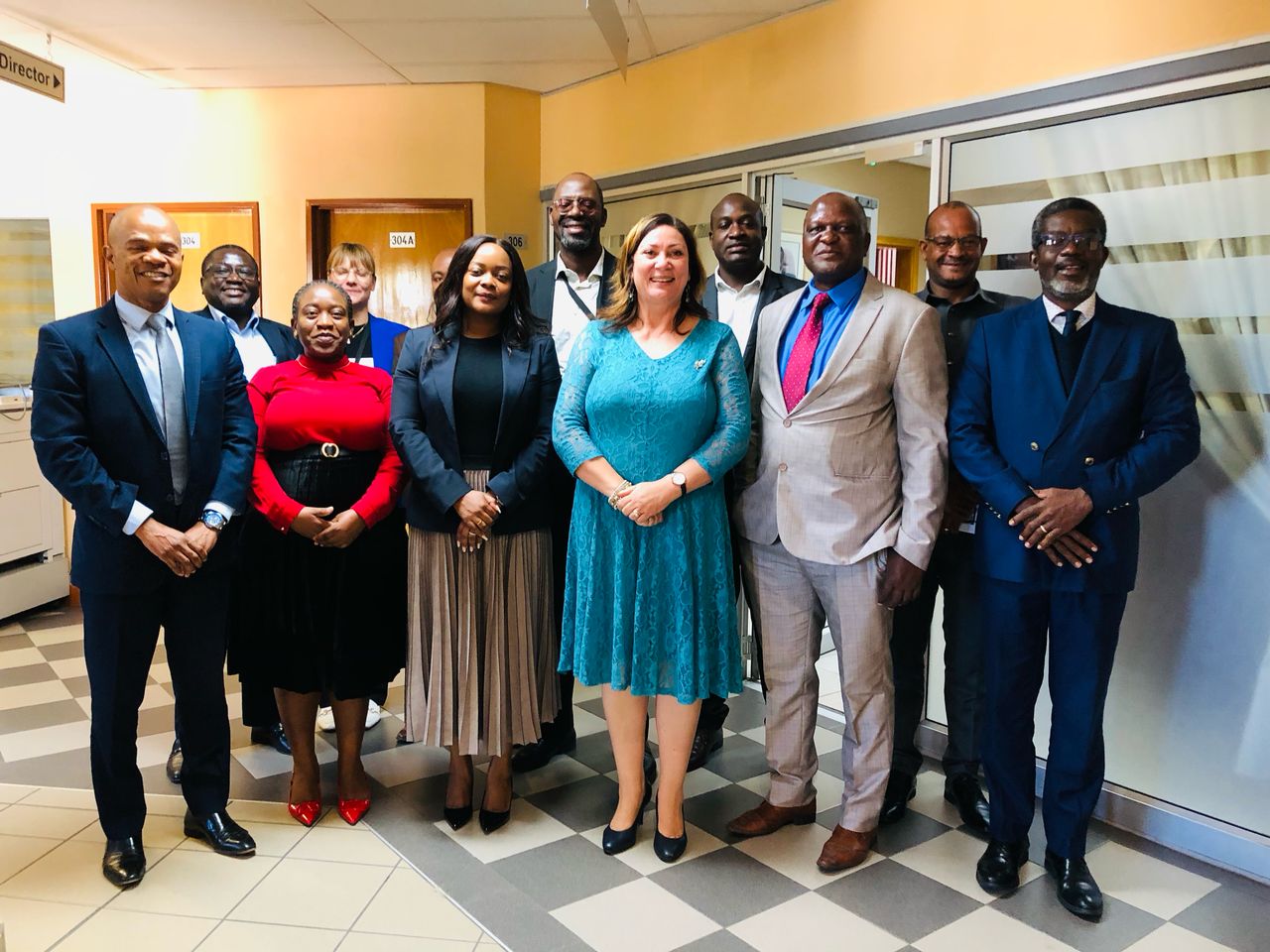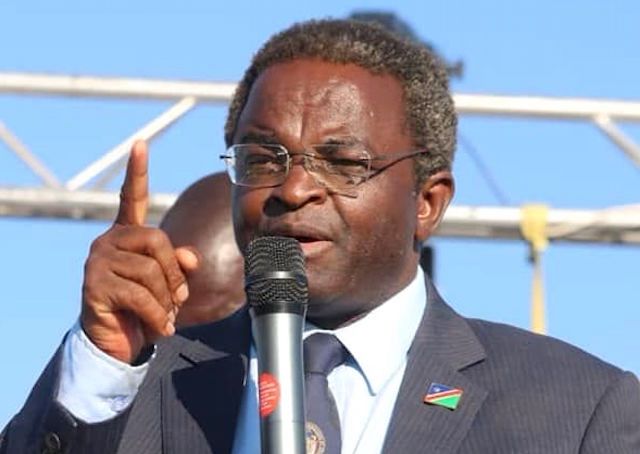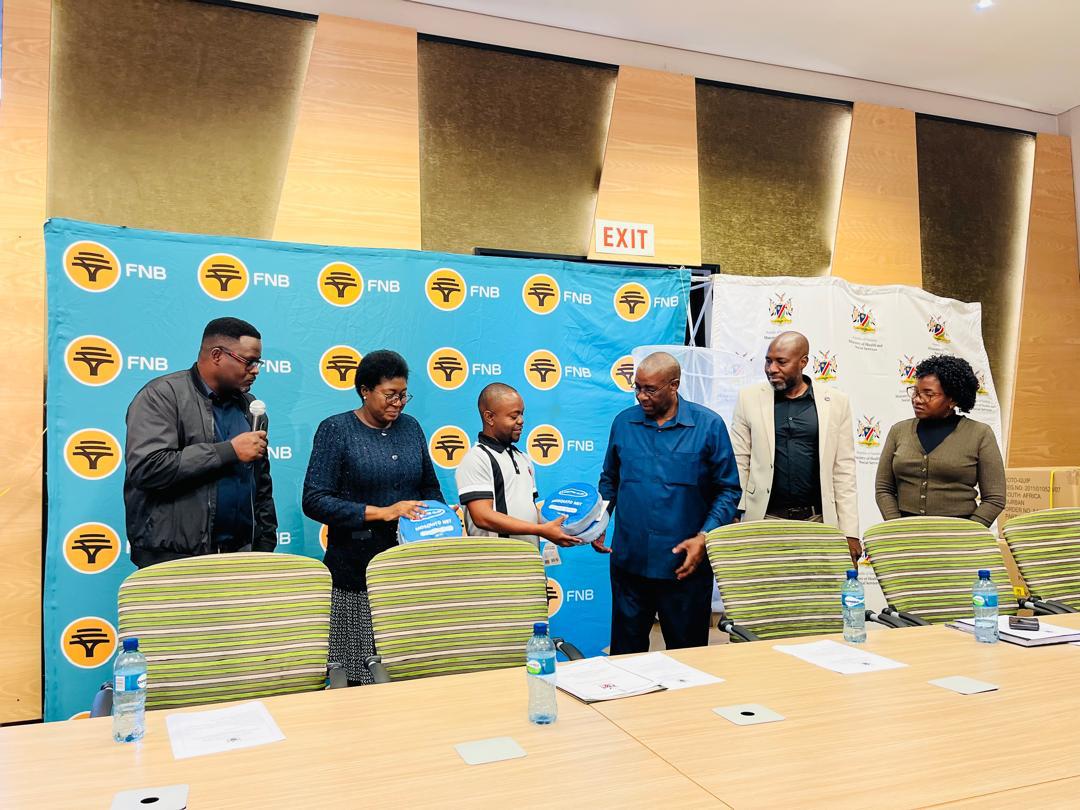Three scenarios ranked by Daily Maverick by what it means for you.
The charts below show the parties in Parliament. Scenario 1 is the existing GNU. In Scenario 2, ActionSA and Bosa join the GNU and the DA leaves. In Scenario 3, the EFF is brought into government, along with ActionSA and Bosa, while the DA leaves.
Note that these are moving scenarios in which much may change.
Scenario 1 — the status quo holds
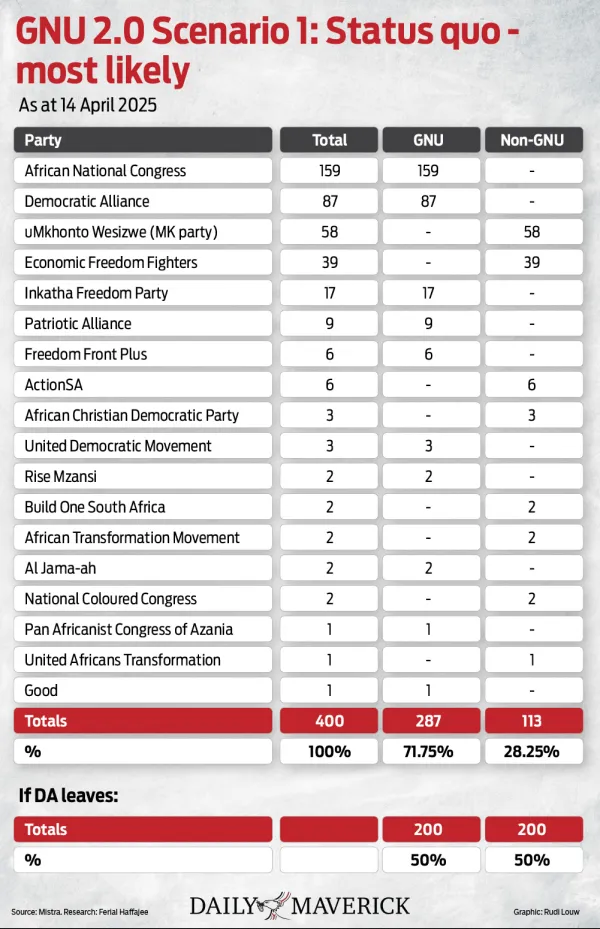
This is Scenario 1, where the ANC and DA realise that while they don’t like each other, most South Africans support the GNU, and its establishment almost a year ago gave the country a fighting chance.
The country risk standing has improved as has the investment outlook, although 14 attacks by US President Donald Trump’s administration have harmed economic prospects outside of a domestic scenario.
This is the most likely scenario, but it can change.
“We want to keep the GNU intact. [But] you can’t have the DA insulting the President [Cyril Ramaphosa] and other Cabinet members. At some point, it will break,” said an ANC-aligned official who is not in the talks but is close to them.
Asked whether the GNU was at an “impasse”, he said the relationship was “beyond that” because the DA had taken the 0.5% VAT increase to court.
The DA’s lawfare strategy, in which it fights politics in court, has worked well for the party, but in a GNU, the jury is out on whether you can be both partner and legal adversary so often.
The parties are in a face-off on the Bela (Basic Education Laws Amendment) Act, the National Health Insurance Act and the Expropriation Act, which has modernised old land expropriation laws and made expropriation without compensation one possible measure after a long process set out in the law. No land in SA has been expropriated without compensation since 1994.
“When they lose a debate, they go to court,” said the official, who added that these parallel processes would eventually see this GNU reach a breaking point.
“No, we’re not going to withdraw our case, and it was not discussed at the weekend,” said DA spokesperson Willie Aucamp.
The DA polls, which it takes regularly, show that its members and possible supporters approve the power-sharing arrangement of the centre of the political line with a reformist ANC. The party decided against a “hard exit” even after the fiscal framework was passed with parties outside the unity government.
This fiscal framework is the first of three steps to get the Budget passed by 5 May, which is the date required by Parliament for the three pieces of Budget legislation to be approved.
At the weekend, the chair of the DA’s Federal Council, Helen Zille, said, “The engagement [with the ANC] took place in a constructive atmosphere, with both sides speaking respectfully yet frankly about the need to resolve the impasse over the Budget and to enhance cooperation between the two parties in the context of the GNU.”
Reports in the Sunday Times (paywalled) and News24 (paywalled) suggest the ANC may be giving way on the 0.5% VAT increase, which, in any event, is projected to raise only R13.5-billion in 2025/206. A well-versed source close to the National Treasury told Daily Maverick the ANC leadership could eat humble pie and a change was possible, even with just over two weeks before the VAT increase is due to kick in on 1 May.
Benefits for you
This scenario has the most significant benefit for South Africans as it is broad enough to develop consensus and ensure a measure of political competition that is good for the electorate. This is a good outcome if you’re concerned about stability and the possibility of growth and jobs. You may not have to pay the VAT increase if you’re a consumer.
Risks for you
The lead parties, the ANC and DA, don’t get on. The constant lawfare, squabbling and oneupmanship are painful and haven’t delivered the goods that stability promises. The parties are wide apart on education, health and land policies (often a proxy for housing) and have yet to reach across their divides.
If you are registered for VAT, it may be chaotic to recalculate the percentage increases and time of settlement of everything from regular contracts to recurring contracts, lay-by agreements and property transactions. For more, see this detailed guide from SARS.
Scenario 2 — drop the DA, bring in ActionSA and Bosa
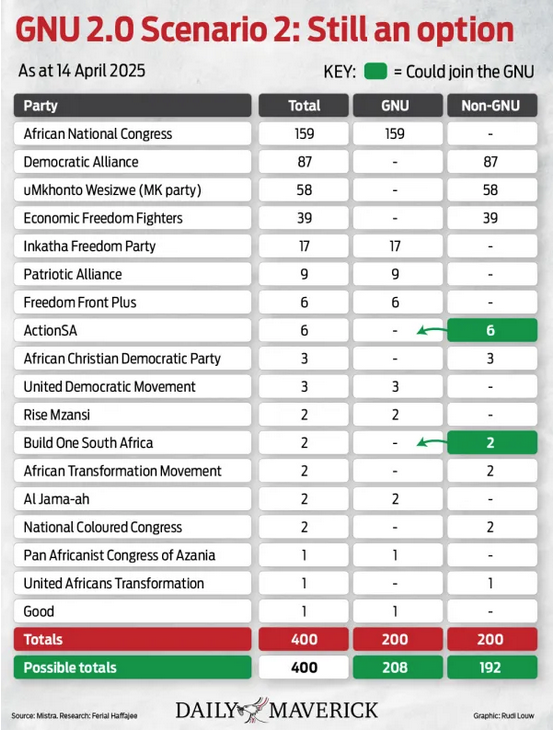
This was our lead scenario until the weekend, as ActionSA and Build One South Africa (Bosa) had joined the ANC to get the fiscal framework passed.
The ANC and DA went bare-knuckled at each other, and the business-friendly Ramaphosa told the business community to stay in its lane when it implored the two parties, with the IFP, to “stay the course, stay in the room, hold the line, keep building and compromise”.
It seemed the GNU in its original form had been roasted, but the main parties walked things back at the weekend.
Whatever happens, it does seem that ActionSA and Bosa will join the GNU, widening it substantially.
Benefits for you
Not many. There aren’t enough big parties in this scenario to meaningfully share power.
Risks for you
While the political squabbling between the ANC and DA in government may stop, the political landscape will be more brittle as the DA brings out its top-drawer opposition politics. All the court battles will make governing an impossible logjam, and South Africa will enter an early electioneering phase as the DA goes into full battle a good year and a bit before the local government polls. There is no national progress as stasis sets in because the opposition parties can band together.
Scenario 3 — a more populist GNU
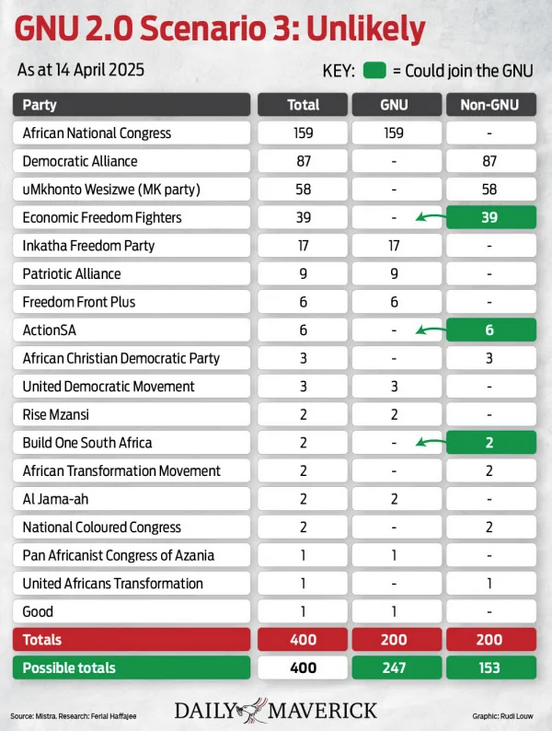
In Scenario 3, the EFF is brought into the government, along with ActionSA and Bosa, to form a more significant majority.
This scenario is receding as an option because the EFF has joined the anti-VAT court action by the DA. (See this report by Victoria O’Regan.) It’s still not an impossible scenario because Deputy President Paul Mashatile is ascendant in the ANC as Ramaphosa’s time in power goes into the beginning of the end.
Later this year, the ANC National General Council will conduct a mid-term review of the party between elective conferences. Because Ramaphosa is in his second term, it will be a council meeting where positioning for leadership starts.
Mashatile said the DA had “positioned itself outside the GNU” (see this report for the transcript), a phrase which has come to define the talks about the future of the power-sharing arrangements.
As the leader of the GNU business, he has not shaped the “clearing house” for conflicts. It is not run as a meaningful effort with a solutions-focused culture to make it work across challenging political divides.
It’s no secret that Mashatile would prefer a different government, such as the one in Gauteng, where a minority government runs things.
Benefits for you
If you’re an EFF supporter, your party gets into government and can shape a radical agenda.
However, if you live in Johannesburg or Ekurhuleni, you will know that such a coalition has few benefits.
Risks for you
Johannesburg’s government of local unity between the ANC, EFF, ActionSA and the Patriotic Alliance (with other minor parties) is the closest facsimile you have to what might happen. The city governance has collapsed primary functions like water, electricity and transport.
It is a performative government where projects are announced almost weekly but where follow-through fails. It exists for patronage — the distribution of posts by portfolio for the control of contracts. As that happens, local taxes rise beyond inflation. DM
Stay informed with The Namibian – your source for credible journalism. Get in-depth reporting and opinions for
only N$85 a month. Invest in journalism, invest in democracy –
Subscribe Now!




